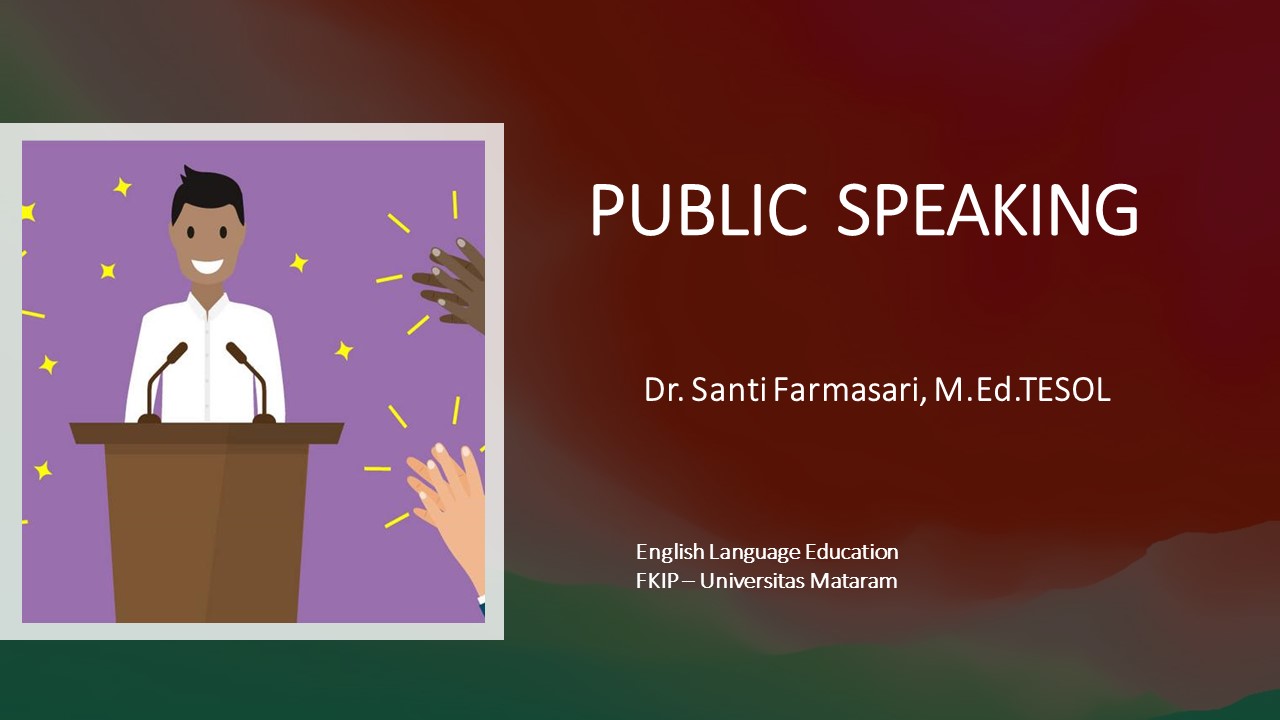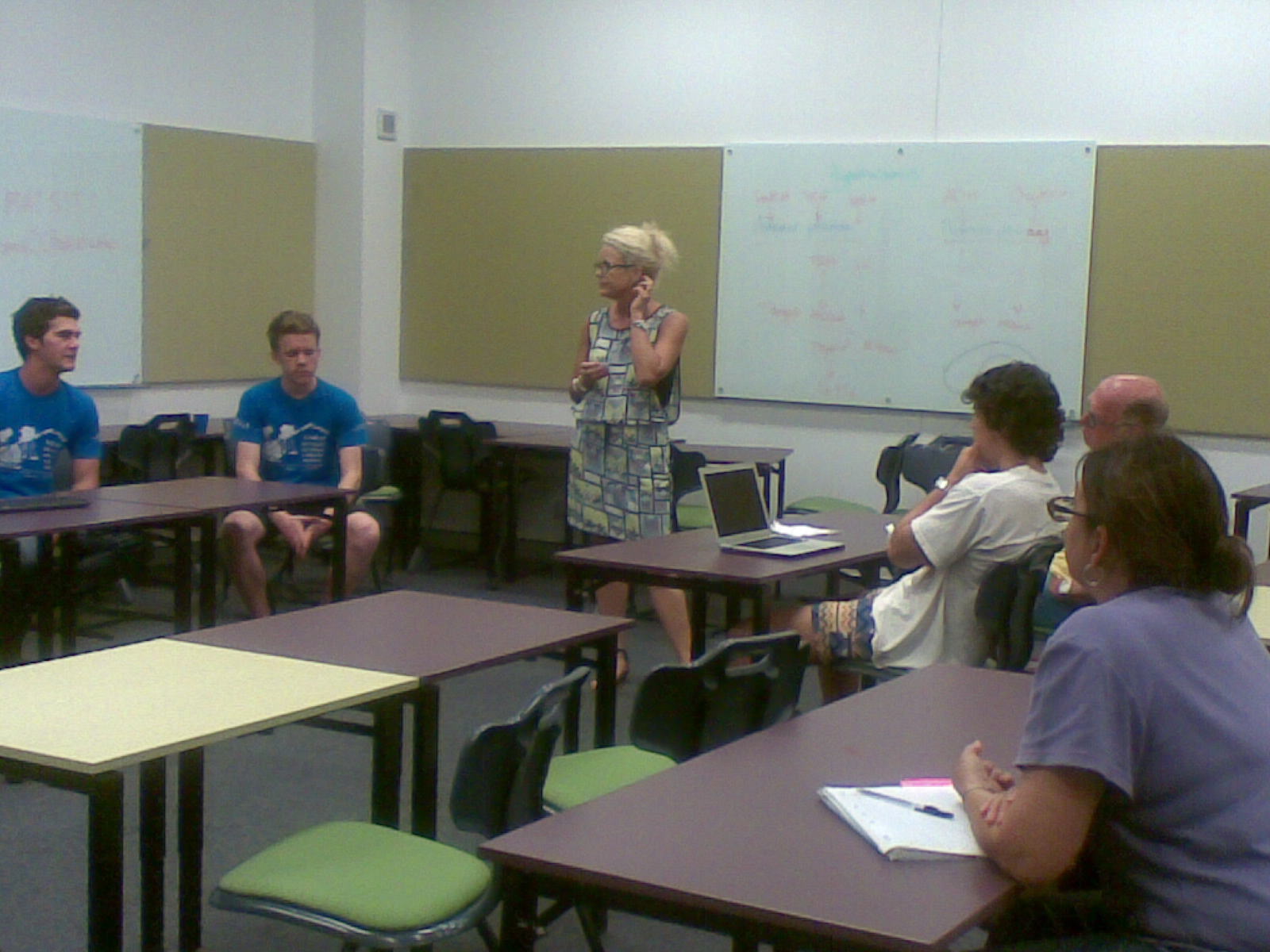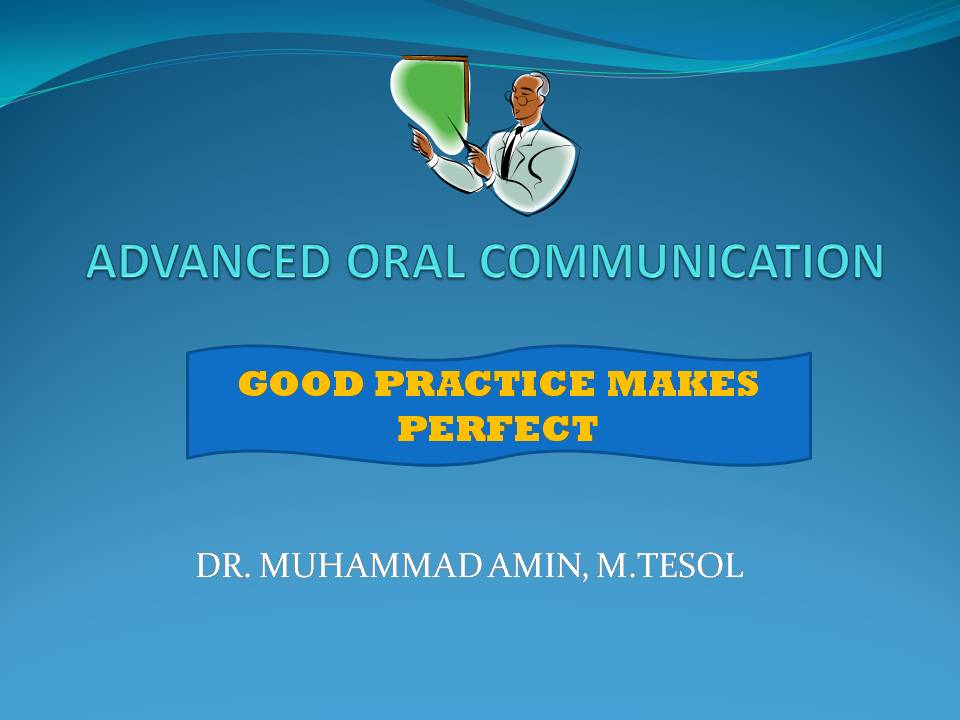
Public Speaking
This course is designed to equip students with language knowledge, skills, manners and strategies of conducting talks for public audiences. Having completed this course, students are expected to gain knowledge and skills, understand strategies and manners of conducting talks in academic seminars or workshops, business and tourism presentations, and broadcasting.

English for Hotel and Restaurant
This course is designed to equip students with language knowledge and skills used at Hotel and Restaurant. Having completed the course, students are expected to be good users and competent users of English for Hotel and Restaurant services for various occasions and conditions.

Innovation in ELT
This course is designed to equip students with knowledge and skills related to innovative methods, techniques and strategies in English Language Teaching (ELT). Specifically, at the end of the course, students are expected to be able to identify challenges and opportunities to plan an innovative English class by employing relevant theories and research findings, including the design of information and technology for classroom practices.
EXTENSIVE LISTENING 2025
This course is designed to get students to comprehend longer spoken discourse of various every day and academic contexts including longer conversation and monologue within Pre-Intermediate to Intermediate Level. The skills that the students are expected to master are getting the facts and making inferences. These skills include finding the main idea, locating specific details, doing note taking, making inferences (finding references, making conclusion, and predicting). The assessment of this course will be based on students’ performance on assignments, test, and a project on comprehending a short-spoken topic taken from media such as YouTube, Podcast, News and TEDtalk by summarizing the content of the media.

ENGLISH FOR TOURIST GUIDES
This course aims to provide students opportunity to learn and practice knowledge and skills relating to tour guiding. The materials cover the scope of tour guiding such as terms used in this industry, fields connected to this business (meeting/picking up guests, helping the clients with the travel documents, conducting tours, saying good bye) as well as communication skills required to function appropriately in the industry. the final part will be to have students conduct specified tours in English.
INTERPRETATIVE READING ATR
This course covers practical implementation of reading strategies. In order to master the competence of interpretive reading, an understanding of the strategy for interpreting explicit and implied information is required. This course also equips students with a variety of texts such as expository, persuasive, analytical exposition and argumentative text based on the students’ level of language competence.

MICROTEACHING
This course provides comprehensive knowledge and skills in practical aspect of teacher education in an online classroom environment. The online sessions are to provide the students with theoretical perspectives on using the teaching skills they learnt previously so that they will able to use these basic skills and teaching techniques when they embark on teaching practicum later. The theoretical sessions will cover the basic concepts in micro-teaching skills such as conducting classroom teaching, engaging in student-teacher communication, providing stimulus variation to students, doing reinforcement and the like. The class will also gear practice-based teaching activities to instill peer and self-evaluative skills in a small group. Students are required to do presentations, which would take approximately 30 minutes each (including feedback). In general, the course aims to give students a broad view of micromanaging classes and provide them with the opportunity to: (1) practice, (2) observe, and (3) evaluate micro-teaching skills. Thus,they will acquire skills of how to share observations on teaching with others constructively . Ultimately, students will develop core teaching skills through planning, implementing and reviewing their own teaching practices.

English for Economics and Business
This course provides the students with the knowledge and skills of using English in economics and business fields through oral and written texts with several topics such as greeting in the world, greeting etiquette, basic terms of economics, job interview, managing a meeting and negotiation, manufacturing, logistic management, capital budgeting, corporate finance, e-mailing, etc. The basic grammatical patterns of phrases, clauses, sentences, paragraphs, essays, and related vocabulary are also highlighted to support their accuracy and fluency of language oral and written production. In the instruction process, the students are required to apply self-independent learning (SDL) through the learning management system (LMS) with multiple platforms and open learning resources provided in this course.
Course Objectives:
By the end of the course, after actively participating in the required meetings, the students are expected to be able to :
- exhibit their oral and written communication competencies through the selected topics.
- demonstrate their adequate comprehension of some basic grammatical rules and vocabulary to support their language production.
- demonstrate adequate skill in understanding and comprehending some topical reading passages and audios.
- demonstrate adequate skill in expressing, constructing, and communicating their opinion, ideas, and feeling through oral and written communication.

CURRICULUM ANALYSIS
This course is intended to provide principles of curriculum analysis and evaluation applied in Indonesian education setting. By the end of the course, students will be able to:
1. Understand the principles of curriculum analysis and evaluation.
2. Analyze and evaluate the existing language curricula in Indonesia
3. Creating an evaluation of the application of language curriculum set forth in today's Indonesian education.
By participating in this course, students will have an opportunity to study theories and practices, which bear most directly on the
processes of curriculum analysis and evaluation 00

ELT SEMINAR
COURSE DESCRIPTION
This course aims to provide a forum and opportunity for English students of FKIP Unram to explore major trends and issues in English Language Teaching. Through library research and various scientific readings, students will be exposed to classroom discussions and presentations. They will be engaged in the discussions and debates of ELT method development, presentation of a variety of language teaching and current research in the Teaching of English as a Foreign Language (TEFL). The ultimate goal of the course is to enable students to integrate their content knowledge and language skills in the oral presentation.
LEARNING OUTCOME
After actively taking part in the face-face to lectures, completing all the required assignments and learning tasks and actively participating in the discussions/seminars, students are expected to be able to produce and deliver materials for a mock seminar and workshop presentation

Language System and Skills
This course aims to assist students to gain knowledge of the four systems of English language, listening, speaking, reading, and writing and their links to grammar, vocabulary, phonology and discourse. Initially, students are introduced to some principles of the four language skills in the foreign language learning. After they know the importance of the language systems, identify various purposes of learning those skills, identify the barriers of learning them, they will be trained to overcome them those barriers.

Academic Writing (KSA)
This is an intensive inter semester course for academic writing by Yuni Budi Lestari, S.Pd., MA., PhD

1A INTENSIVE LISTENING YBL
This course is designed to help students develop bottom-up processing skills. It focuses on the students’ awareness on language form and that the aim of the class activities is to increase the students’ knowledge of the differences in sounds, structures, and the lexical choices, all of which affect the meaning. The class activities allow the students to work closely on certain segments of texts which are carefully selected by the teachers. The activities also allow the students to listen carefully to how sounds fit together in words, how a certain new word is used and how contextual clues can be used to guess its meaning. Thus, this Intensive Listening course is characterized as listening for precise sounds, words, phrases, grammatical units and specific/detailed information.

5CG-2 Researh on ELT
This course will introduce you to theories and practices on ELT research. It will include both qualitative and quantitative paradigms as well as single and multivariate perspectives. You will also practice the use of parametric and non-parametric measures of relationship among variables.
The course will have theoretical concept sessions followed by individual or group practices. Participation is highly valued and indiscipline will not be tolerated.
As it involves online accesses to materials and hands-on statistical analyses of data, having a personal computer is highly recommended.
Happy learning

ACADEMIC WRITING
This course is part of language skill courses at the English Department, School of Education, Mataram University. The course is aimed at developing writing skills associated with academic worlds. The course starts from 7-paragraph essay writings to 25000-word paper writings. It will cover all skills relevant academic writing such as the nature of audience, the purpose of writing, the organization of ideas, the flow of ideas, the style of writing, and the presentation of the paper. note-taking, paraphrasing, summarizing, quoting, referencing, and end-note reference writing will be included in the course. Ethical issues like being objective, avoidance of plagiarism and personal, racial, and gender biases are also offered.
This course involves more students' independent learning with lecturer's continuous online feedback. Active participation is required.
ADVANCED ENGLISH GRAMMAR
LEARNING OBJECTIVES (LO):
After attending all required meetings, participating actively in the discussion, and doing all tasks assigned in this course, the students are expected to be able to master advanced English Grammar needed for both presenting high-school (SMU) structure materials and coping with their studies.
ORGANIZATION & TOPICS:
This course consists of five units, each of which focuses on a particular point of English Grammar. Every unit systematically consists of a PRE-TEST (used as a warming-up activity before the presentation of the main materials), GRAMMAR EXPLANATION & EXERCISES, SELF-ASSESSMENT, REFLECTION ON LEARNING, and a POST-TEST (to measure students’ mastery). The explanation and some exercises in this course material are taken and adapted from various English grammar sources; thus, any confusion caused by the explanations can be addressed by consulting the original sources as mentioned in the references in every unit. The topics include Inversions (A-D), Verbs as Complements (A-F), Adjective Clauses (A-G), Noun Clauses in Complex Sentences (A- F)and Word Choice/Troublesome Words (A-D).Besides, this book also contains Practice Exercises (5 practice exercise) to provide more practice to the students.
